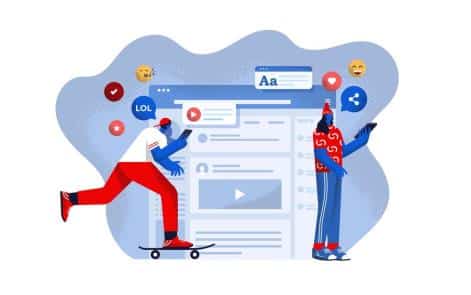In today’s digitally driven world, social media platforms have become integral to our daily lives, influencing nearly every aspect of human interaction and communication. While these platforms offer numerous benefits, such as facilitating connections and providing access to information, they also present significant challenges. This essay explores the multifaceted impact of social media by examining both its advantages and disadvantages.
Global Connectivity and Communication
One of the primary advantages of social media is its ability to connect people across the globe. Platforms like Facebook, Twitter, and Instagram allow users to maintain relationships with friends and family who are geographically distant. This connectivity is not just limited to personal relationships; it also extends to professional and educational opportunities, enabling people to network and collaborate regardless of their location.
Accessing and sharing information
Social media has transformed the accessibility and dissemination of information. Users can stay updated with the latest news and developments worldwide without relying on traditional media sources. Platforms like YouTube provide educational content on a vast array of topics, making learning accessible to everyone. Furthermore, social media can play a critical role in times of crisis, such as natural disasters or political unrest, by disseminating timely information and facilitating community support.
Business and marketing innovation
For businesses, social media is a powerful tool for marketing and customer engagement. Companies can interact directly with their customers, receive feedback, and personalize their marketing strategies. Social media also enables small businesses and startups to gain visibility and compete in the market without the need for large advertising budgets.
The Drawbacks of Social Media
Privacy Concerns and Data Security
Despite its benefits, social media poses significant risks to privacy and data security. Users frequently divulge personal information to third parties for advertising and other purposes, sometimes without their explicit consent. High-profile data breaches have exposed vulnerabilities in social media platforms, raising concerns about user security and privacy.
Mental health impacts
There is a growing recognition of the significant impact of social media on mental health. The pressure to maintain a certain online image and the constant comparison to others can lead to anxiety and depression. Moreover, excessive use of social media can disrupt sleep patterns, reduce physical activity, and impair face-to-face interactions, further exacerbating mental health problems.
Misinformation spreads
The ease of sharing information on social media also comes with the challenge of misinformation. False news can spread rapidly, influencing public opinion and sometimes leading to harmful behaviors. The difficulty in controlling the spread of such misinformation makes social media a double-edged sword in terms of public knowledge and opinion.
Recommendations for Responsible Social Media Use: Balancing the Scale
Developing digital literacy
To mitigate the risks associated with social media, enhancing digital literacy is crucial. We should educate users about the significance of privacy settings, identify trustworthy sources, and understand the consequences of sharing personal information online.
Implementing stricter regulations
Governments and regulatory bodies need to enforce stricter regulations on social media platforms to ensure user data protection and prevent the spread of misinformation. This includes holding platforms accountable for data breaches and ensuring they actively verify the information before disseminating it.
Promoting Mental Health Awareness
Social media platforms must prioritize promoting mental health awareness and providing resources for users who may experience negative effects from online interactions. Implementing features that encourage breaks and real-life interactions can help mitigate some of the negative impacts on mental health.
Conclusion
Social media is a complex phenomenon that brings both significant benefits and serious challenges. By understanding and addressing these challenges, individuals and societies can better harness the positive aspects of social media while minimizing its negative impacts. Through responsible use, continued innovation, and appropriate regulation, social media can remain a powerful tool for global connectivity and learning without compromising personal well-being or societal stability.



